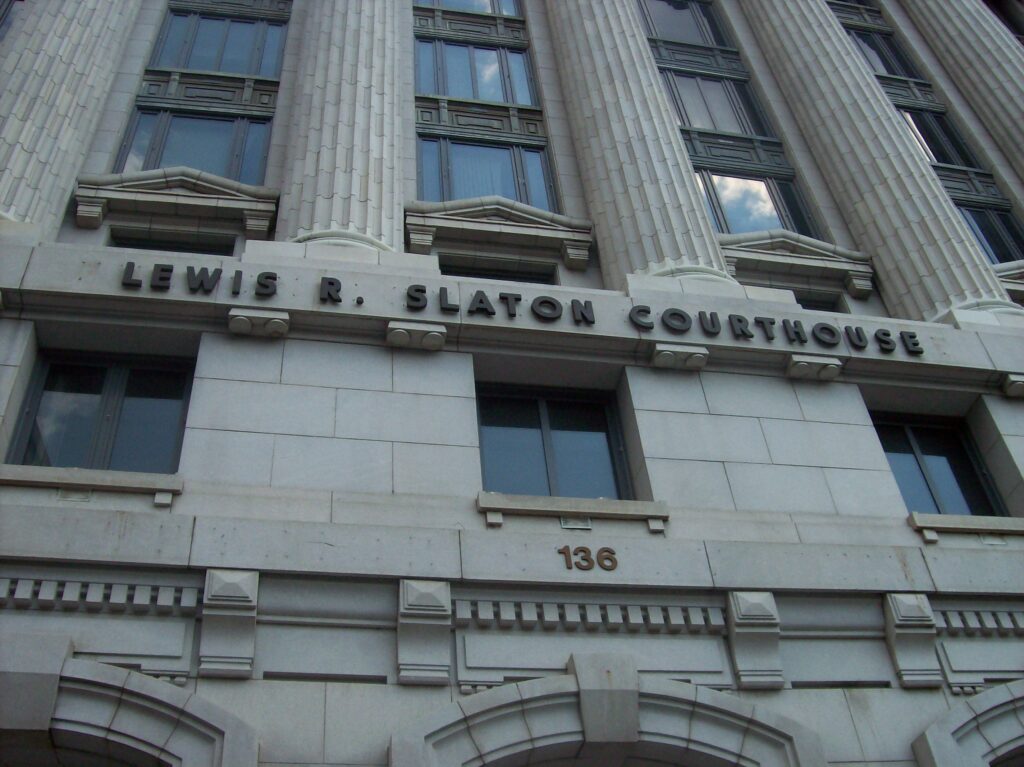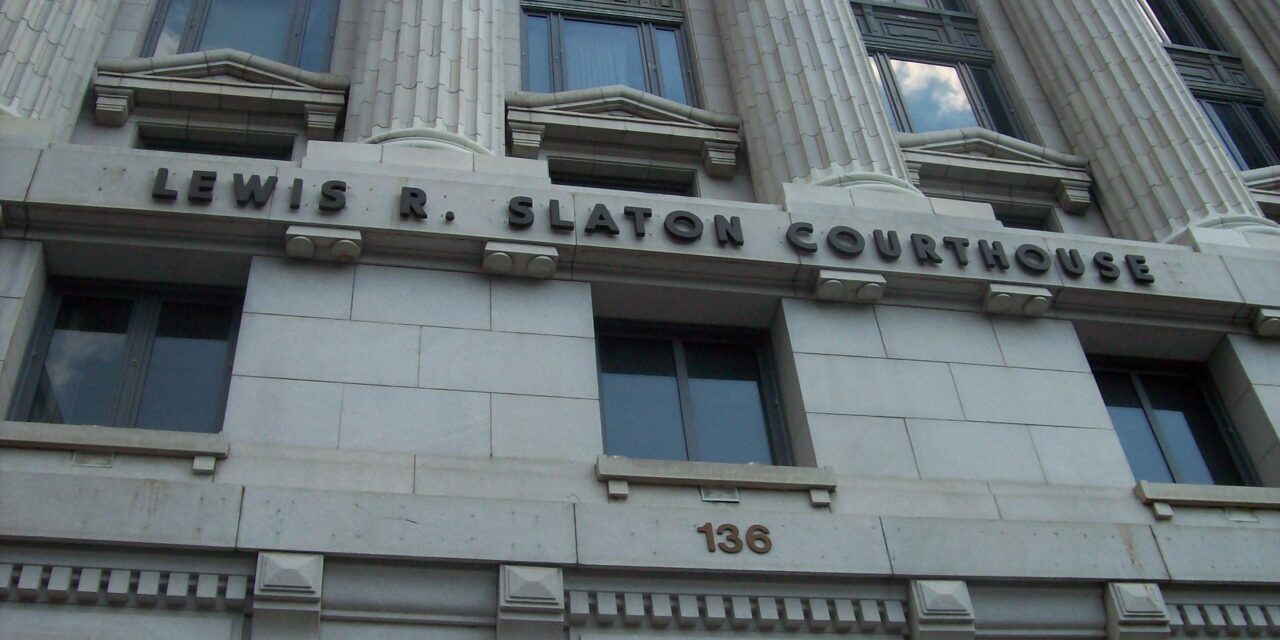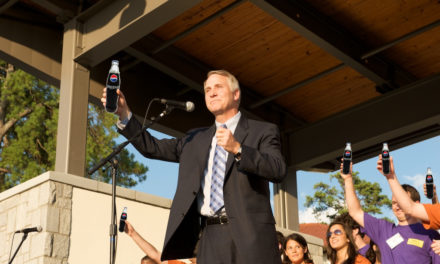A Fulton County grand jury indicted former President Donald Trump and 18 of his allies late Monday evening. The investigation, led by Fulton County District Attorney Fani Willis (96L), resulted in Trump’s fourth criminal indictment in the past five months.
The grand jury indicted Trump on 13 felony charges surrounding his attempt to overthrow Georgia’s 2020 presidential election result. The indictment’s co-defendants include Republican allies, such as Trump’s former chief of staff Mark Meadows and former attorney Rudy Giuliani.
“The indictment alleges that rather than abide by Georgia’s legal process for election challenges, the defendants engaged in a criminal racketeering enterprise to overturn Georgia’s presidential election result,” Willis said at a Monday press conference.

A Fulton County grand jury indicted former President Donald Trump on 13 felony charges following an investigation led by Fulton County District Attorney Fani Willis (96L). Photo courtesy of Wikimedia Commons/DukeArcTerex
The 41 charges include 22 counts of forgery or false documents and eight counts of soliciting or impersonating public officers. Additionally, the jury assigned three counts to influencing witnesses, election fraud and computer tampering and one count to racketeering and perjury charges.
In addition to the 19 defendants, the jury identified 30 co-conspirators who have not been indicted but could face future charges.
Grand juries in Manhattan, N.Y., Miami and Washington, D.C. previously indicted Trump. The number of defendants in the Georgia case is far greater than in any previous Trump indictment. This is unsurprising, Associate Professor of Political Science Bernard Fraga said, given the large network of parties involved in the attempt to overturn the election results.
Georgia’s indictment is the first to include Racketeer Influenced and Corrupt Organizations Act (RICO) charges against the former president. The 1981 Georgia law, which was adapted from a federal racketeering statute, has been successfully used to prosecute organized crime.
This statute is one Willis knows well, with Monday’s charges marking her 11th RICO indictment as district attorney.
However, Charles Howard Candler Professor of Law Morgan Cloud said this is unlike any other case Willis has handled before.
“It’s becoming a cliche, but we can’t really compare this to any other case,” Cloud said. “There’s never been a case like this, so it doesn’t matter whether she’s done 11 or 111 RICO prosecutions, they will not be like this one.”
Georgia’s statute has broader implications in this indictment compared to its federal counterpart. Unlike in the state law, the crime of making a false statement or writing is not listed as a racketeering crime in the federal statute — an offense attributed to many of the defendants in the Georgia indictment.
Under federal law, defendants tried in state trials for actions they committed in their role as a federal employee can request for the case to be moved to a federal court, where they would be subject to the federal RICO law. While there have been several U.S. Supreme Court cases that set some precedent for the interpretation of the law, none have involved a former president.
Meadows filed a brief requesting to move his case to a federal court on Tuesday. Additionally, the former chief of staff argued for his right to immunity as a federal employee in this case. However, his identity as a former federal employee does not guarantee either of these demands will be granted.
“It’s not the job title that matters, as much as were the actions alleged to be crimes actually something that was part and partial of the statutory or constitutional authority that goes along with that job?” Cloud said.
In submitting her indictment, Willis suggested starting prosecution in six months, although the timeline will ultimately be up to the presiding judge.
Cloud said it would be “rather remarkable” if the trial began this early, but noted that Georgia’s speedy trial laws, which allow any indicted defendant to request a speedy trial, could impact the trial timeline.
“Georgia’s speedy trial law really does add an interesting wrinkle to the question of when this trial would occur,” Cloud said. “If all the involved 19 defendants agree to the same delaying strategy, which is a famous part of Mr. Trump’s long litigation history, then this won’t be an issue, but who knows? We don’t know.”
Fraga said that Willis’ decision to use the statute signals she is “being very careful, very deliberate” and ensuring “the case is solid.”
“We have to in some ways separate these legal proceedings from the electoral calendar,” Fraga said. “Willis is not thinking about the timeline in terms of the election. She’s thinking about it in terms of the timeline to build the case, prosecute and to proceed to trial and to continue from there.”
As of Aug. 17, Trump has climbed an average of 8.5 percentage points in the national polls since his first indictment on March 30, according to FiveThirtyEight.
Fraga, who researches U.S. election and polling data, said “it’s a little early to tell” how the indictments against Trump might affect his 2024 presidential run.
“Recent polling data indicates that this is having no negative impact on Trump’s standing with Republican primary voters,” Fraga said. “If anything, Trump’s indictments but also general legal troubles seem to improve his standing with his strongest supporters and the Republican primary base.”
However, Fraga said there are signs of declining support for the former president among Republicans unlikely to vote in the primaries or who already oppose Trump. For now, he said, this does not pose a large threat to the Trump campaign.
“What’s important to remember is that for Trump this is a marathon and not a sprint in terms of reclaiming the presidency,” Fraga said. “And for the first stage, … the Republican primary, these legal battles don’t seem to be having a negative impact on him.”
Sarah Davis (22Ox, 24C) is a co-Editor-in-Chief of the Wheel. Previously, she interned with The Atlanta Journal-Constitution, The Covington News and Austin Monthly Magazine. In her free time, you can find her exploring new running trails and coffee shops around the city.







